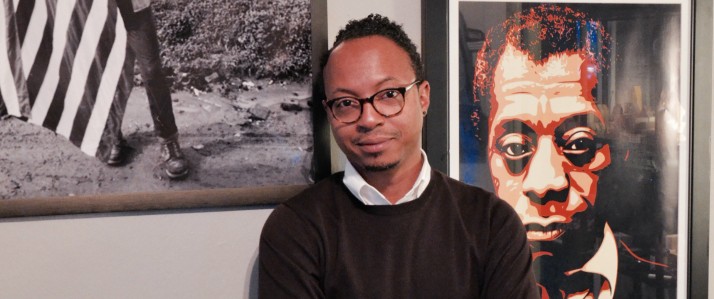Stephan Herrera is MRG Foundation’s newest team member, bringing more than a decade of experience in community organizing and organizational development! As the Capacity Building Director, Stephan will lead our new Capacity Building Initiative, working with a cohort of ten grassroots groups for three years to strengthen organizational, financial, and fundraising capacity. Read on to learn more about Stephan’s background — and his social justice theme song!
1. When and how did you first get connected to MRG?
Stephan Herrera: In the early 2000’s, I worked for an organization called Brother to Brother, which was pretty much the only group organizing Black gay and bi men. Early on in our work, we received a grant from MRG which allowed me join Brother to Brother’s staff at half time.
2. What are you most excited about in joining the MRG team?
Stephan Herrera: I’m very fortunate to find a place that marries your interests, your politics, and your skills – MRG is definitely that place for me. Coming to MRG lets me contribute my organizing and capacity building experience to the movement, it fuels my interest in progressive philanthropy, and provides a space for me to live out my social justice values.
3. Why do you think the Capacity Building Initiative (CBI) is important to Oregon’s social justice movements?
Stephan Herrera: Over the past 40 years MRG has funded great social justice work and a lot of organizations have grown from early MRG seed funding into strong anchor organizations. On the flip side, some groups – even groups doing powerful and important work – have struggled to establish their footing and gain traction. I think about Brother to Brother, which got early funding from MRG but never developed honed fundraising strategies or organizational infrastructure and eventually fizzled out. I think if we had had the Capacity Building Initiative ten years ago, Brother to Brother might still be around as a powerful force for LGBTQ organizing in Oregon’s Black community.
4. What advice do you have for potential CBI applicants?
Stephan Herrera: Since MRG will provide the ten CBI participants with three years of funding, instead of the one year of funding general fund groups receive, the CBI application process is more intensive than our general fund process. Because of the time involved in the application, I strongly encourage groups to start the process early. The application will take time and buy-in from volunteer leadership, so groups that wait until the last week to apply are far less likely to be successful.
And definitely call or email me with questions. That is exactly what I’m here for!
5. What are some organizational challenges that are exacerbated for groups rooted in communities of color and rural communities?
Stephan Herrera: For both, there are visibility issues and accessibility issues that go hand in hand. Because of both physical and social distance, groups based in rural communities and communities of color often struggle to get noticed by major donors and media outlets. And, because their work doesn’t often get recognized or publicized, these groups also hit unique barriers when trying to access funding and culturally appropriate technical assistance – the two things groups need to reflect and evaluate their work, build infrastructure, and grow to scale.
6. What key lessons did you learn while you were working at Portland Community College and the Urban League of Portland – first as their Health Equity Organizer and later as Organizing Director?
Stephan Herrera: At Portland Community College, I was able to hone my skill set and deepen my understanding of project management, fundraising, and leadership development. I got great experience – and had some great mentors – developing curricula and trainings and helping students take their ideas, build a plan, and execute their work. I was also really excited to apply a social justice framework to higher education. My interest in philanthropy, as a tool for social change, also emerged at PCC.
Working at the Urban League of Portland, and working specifically on the State of Black Oregon report, I learned quite a bit about how public policy can improve the lives of communities of color and, in turn, how community organizing led by those most impacted is such an essential component of ensuring the creation and passage of better public policies.
7. What’s something you’ve done that you’re really proud of?
Stephan Herrera: One of my proudest accomplishments is definitely helping to found Portland Black Pride – to my knowledge, it was the first culturally specific Pride in the Northwest. We laid the groundwork and created a model that API Pride, Latino Pride, and Seattle Black Pride were able build off of. At that time, there was – and really, still is – such a need for culturally specific LGBTQ programming and community building and we were able to use Pride as an organizing tool to disseminate sexual health information to a hard to reach population and leverage resources to put a dent in HIV infection rates.
8. Is there a social or racial justice issue that you’re especially passionate about?
Stephan Herrera: Issues surrounding immigration have become very personal for me. My father emigrated from Central America in the early 70’s and he was, frankly, really lucky. And if he hadn’t been lucky I wouldn’t have the life that I do. There’s so much more work to do to afford more people the opportunities that my family has had and to ensure that – regardless of where you’re born – everyone has what they need to live and thrive.
9. What’s something about you that might surprise people?
Stephan Herrera: It’s been a while since I’ve done this, but if you do a Google Image search for “lgbt racial justice” my picture is among the first ones to pop up!
10. Do you have a social justice theme song?
Stephan Herrera: There are two close competitors: “What’s Going on” by Marvin Gaye and “Fight the Power” by The Isley Brothers.
MRG’s Capacity Building Initiative will pair significant funding with intensive technical assistance and peer-learning opportunities for a cohort of ten grassroots social change groups in Oregon. To be eligible to apply, groups must (1) have received a General Fund or Travel Grant from MRG since July 1, 2010, (2) have budgets under $300,000, (3) not receive substantial government funding, (4) be ready to commit to full participation in the initiative for three years. For full criteria, more information, and the application, contact Stephan: 503-289-1517 or [email protected]





